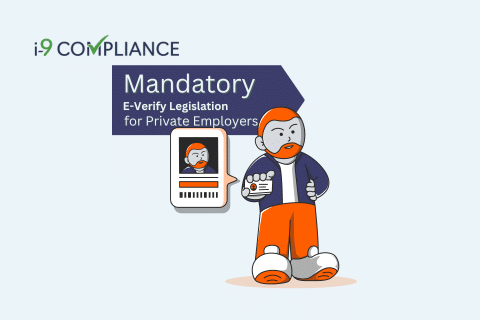Florida Senate Passes Mandatory E-Verify Legislation for Private Employers

May 5, 2023
The Florida Senate has passed a major immigration reform bill. Accompanied by many other provisions, this bill would mandate businesses with over 25 employees to use the federal government’s E-Verify system. The E-Verify system verifies the employment eligibility of new hires. If enacted, employers must begin using the system starting July 1, 2023.
Employers enrolled in this system can use it to electronically compare an employee’s Form I-9 information against records maintained in government databases. For example, E-Verify would search through databases maintained by the Department of Homeland Security and the Social Security Administration. In most cases, employers receive a response within a few seconds from the system. Typically, they will receive a confirmation about an employee’s work authorization, though some cases may require further action.
There is no federal requirement that private employers use the system outside of federal contractors. Despite this lack of condition, the system has seen wide use, with over one million employers using it at the end of 2022. This use resulted in almost 300,000 case inquiries within the calendar year. As of March 2023, Florida alone has over 80,000 employer accounts.
State regulations require public employers in Florida to use the E-Verify system to check employment eligibility. In addition, it applies to public contracts, which must have a valid E-Verify certificate for the contracts to receive approval. Furthermore, subcontractors in a contract must provide the primary contractor with a sworn statement that they do not employ unauthorized workers.
This requirement aligns with most states that have not passed regulations requiring the use of the federal program. Only seven states have passed laws requiring private employers to use the E-Verify system. These states are Alabama, Arizona, Georgia, Mississippi, North Carolina, South Carolina, and Utah. Their state requirements also apply to public employers as well as public contractors.
The bill passed by the state Senate would give the Department of Economics the power to penalize companies that fail to comply with E-Verify requirements. This penalty includes up to $1,000 daily fines for failing to comply. Next, the bill will proceed to the Florida House, where it must receive passage before reaching the Governor.
Currently, mandatory E-Verify and other work authorization verification bills have increasingly gained attention across the country. As this trend continues, employers will find it more crucial to comply with all employment eligibility verification (Form I-9) requirements. The best way is to incorporate an electronic I-9 management tool with E-Verify integration into the onboarding process. This tool can automate the process and ensure uniform state and federal regulations compliance.
Streamline your hiring process with an automated employment eligibility verification and ensure compliance today with I-9Compliance.